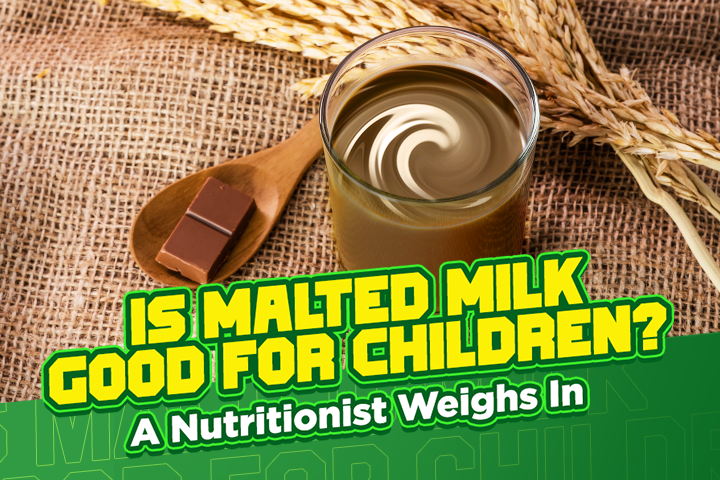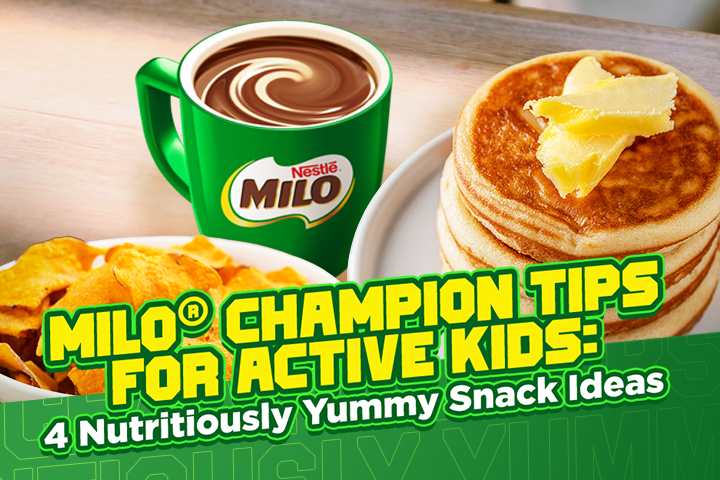
Is Malted Milk Good for Children?
Have you ever wondered what the term “malt” means when it’s attached to milk or chocolate malt drinks like MILO? In essence, malt is a carbohydrate that has a toasted caramel, and nutty profile and offers a creamy finish to beverages. Malt is derived from grains–the most popular being barley–that have sprouted and undergone a mashing process.
More than that, malt actually has several health benefits. It fortifies milk-based drinks like MILO with more nutrients that children need for growth and development. We asked Jo Sebastian, a licensed nutritionist, and dietitian, to share her expertise and explain why drinking malted milk can prove beneficial for your kids. Read on:
It’s full of antioxidants that may help in brain development and boost memory.
“Malted milk is a great source of zinc, magnesium, vitamin A, and B12,” said Jo. According to her, these nutrients are essential for brain development, especially among children. She also pointed out that magnesium facilitates nerve function and prevents nerve cell death. Zinc, on the other hand, helps in nerve function and brain development while Vitamin A helps with memory and vitamin B12 assists in creating nerve signals.
It may strengthen the blood due to its high iron content.
As malted milk is packed with iron, it can also help in promoting healthy blood flow in your child. “It’s common for children to be low in iron,” says Jo. Supplementing low iron with iron-rich foods or snacks is essential to help improve energy levels and overall health. “Iron is vital to help red blood cells carry oxygen around the body, further brain development, and fight infections and promote growth.”
It helps provide energy and boosts metabolism.
The more oxygen-rich blood flows around your child’s body, the more energized they’ll feel. But aside from iron, malted milk contains high levels of B vitamins, as it’s often a combination of milk and other grains. “Malted milk is rich in vitamin B6, B12, riboflavin (B2), niacin (B3), pantothenic acid, folate, and thiamin,” Jo explains. “All of these help in metabolizing macronutrients to provide your body with energy throughout the day.”
It helps keep skin fresh and healthy.
The benefits of drinking malted milk don’t just happen inside the body—you can also see its effects on your kid’s skin health. “Vitamin B2, or riboflavin, vitamin D, C, and zinc are some nutrients found in malted milk which are vital for improving and maintaining good skin,” Jo shares. These nutrients are also known to help improve vision health.
It’s rich in quality protein.
“Protein is an essential nutrient that’s much needed to help build and repair tissue, cells, and muscles,” Jo says. A single serving of MILO, for example, contains about 3.2 grams of protein, which is around 11 percent of the Recommended Energy and Nutrient Intake (RENI) for children aged 6 to 9 years old.
According to Jo, drinking malted milk can be an important nutritional factor among children who have difficulty eating sufficiently to cover their dietary needs. “Malted milk is also high in calcium, potassium, iron, and other nutrients often lacking in children’s diets,” she adds, as nutrient-deficient meals are simply not enough to supplement your child’s growth.
Let your kids face the day head-on by kickstarting their morning with a glass of MILO with their breakfast. Adding water to everyone’s favorite chocolate malt powder to make a nutritious drink will let your child enjoy several malted milk benefits. MILO contains Vitamin B2, B3, B6, B12, C, D, iron, calcium, and phosphorus that provide the energy boost your child needs throughout the day.




